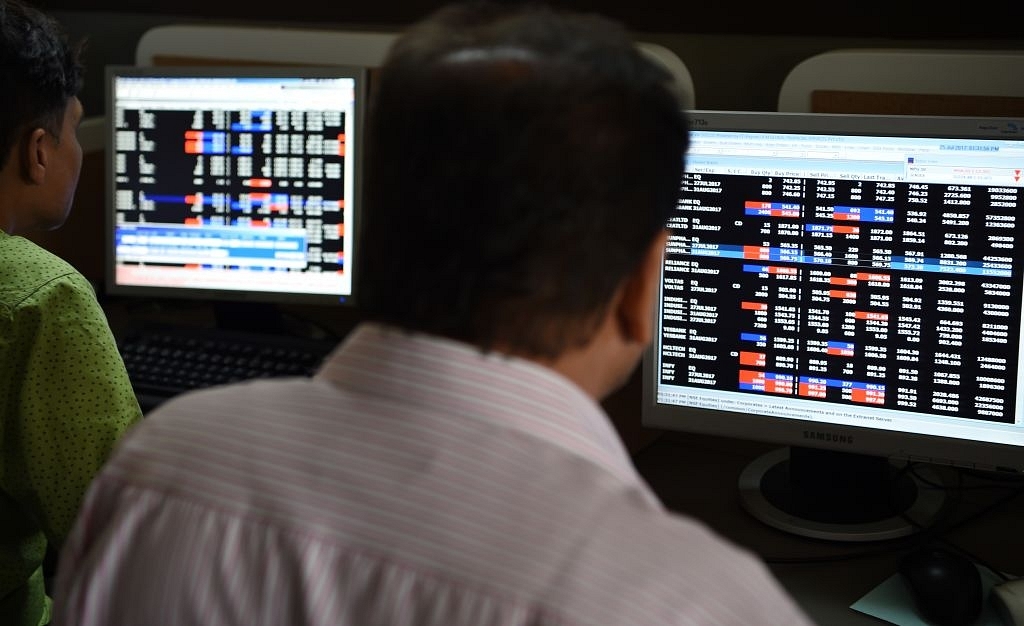Economy
Nifty@10,000: Is Dumb Domestic Money Doing Better Than Smart FII Money?
- While FIIs are engaged in heavy speculation, domestic investors are investing in equity and sitting tight. Here is why the latter have got it right, very likely.

Indian stock traders watch share prices on their terminals at a brokerage house in Mumbai on July 25, 2017. (INDRANIL MUKHERJEE/AFP/Getty Images)
With the markets are at new highs of over 10,000 on the Nifty, and over 32,000 on the Sensex, and given the anaemic GDP growth forecasts for this year, one has to ask: do the markets know something that we don’t? And is this yet another case of retail investors getting in just when the smart money is moving out?
The answer is probably no. This may be a rare case where stable domestic money is smarter than skittish hot money coming in from abroad.
Retail money is looking smarter than the smarts, including foreign institutional investors (FIIs). The data available so far suggests that while FIIs are busy speculating – that is weaving in and out of stocks endlessly – the retail investor is solidly behind the rise in indices. She is staying put – and doing it with the help of fund managers in mutual funds. This is because the idea of systematic investment plans (SIPs) have become part of mainstream investor consciousness.
To date (upto 13 September), FIIs have invested a net amount of Rs 43,140 crore, while mutual funds invested Rs 72,450 crore in equity. This means this rally is being driven by domestic money, not foreign money.
A more interesting factoid is that the FIIs are speculating more than investing.
For investing a net Rs 43,140 crore, the FIIs bought over Rs 9.27 lakh crore of equity and sold Rs 8.84 lakh crore. Domestic mutual funds speculated less, buying Rs 3.63 lakh crore, and selling Rs 2.91 lakh crore.
Let’s put in another way. For every Re 1 of investment, the FIIs are trading 20 times as much. How smart is that when transaction costs are high?
This is odd because the rupee has been rock-steady, precisely the condition in which foreign money should have been keener to invest, since exchange rate losses would have been lower. If, instead of investing, they have been busy trading and speculating in futures and options, they are essentially incurring huge transaction costs at a time when long-term investing would have been more profitable. It is thus quite possible – though we can’t say this definitely – that domestic funds made more gains by simply investing in equity and sitting tight, while the FIIs may have made very small gains from speculation. Nowhere in the world have speculators and traders gained more than long-term stock pickers and investors like Warren Buffett.
At some point, given the global surge in liquidity, FIIs can’t just be flitting in and out, more so if the rupee is set to weaken due to the possibility of a looser fiscal policy and lower rates in a weak economy. If we additionally assume that growth is bottoming out this year, and next year (2018-19) we will see GDP taking off vertically, the markets could conceivably be much higher valued than now.
According to Atul Suri, CEO of Marathon Trends Advisory Pvt Ltd, who tracks macro trends in global equities, emerging markets will see a further boom. In an interview to CNBC TV-18, he said: “We are going to have almost a 17,000 kind of Nifty in the next four years which is again almost 14 percent or so CAGR (compounded annual growth rate) for the next 4-5 years. Now it does not mean every year it is going to be positive, it does not mean every day there will be corrections. Yes, we will get tested, yes doubts will come. But, the big story for an Indian investor is that should he be in (stocks)? The answer is yes.”
Only time will tell if he is going to be right, but if he is even half right, domestic dumb money may well do better than smart FII money over the next four years.
Support Swarajya's 50 Ground Reports Project & Sponsor A Story
Every general election Swarajya does a 50 ground reports project.
Aimed only at serious readers and those who appreciate the nuances of political undercurrents, the project provides a sense of India's electoral landscape. As you know, these reports are produced after considerable investment of travel, time and effort on the ground.
This time too we've kicked off the project in style and have covered over 30 constituencies already. If you're someone who appreciates such work and have enjoyed our coverage please consider sponsoring a ground report for just Rs 2999 to Rs 19,999 - it goes a long way in helping us produce more quality reportage.
You can also back this project by becoming a subscriber for as little as Rs 999 - so do click on this links and choose a plan that suits you and back us.
Click below to contribute.
Latest